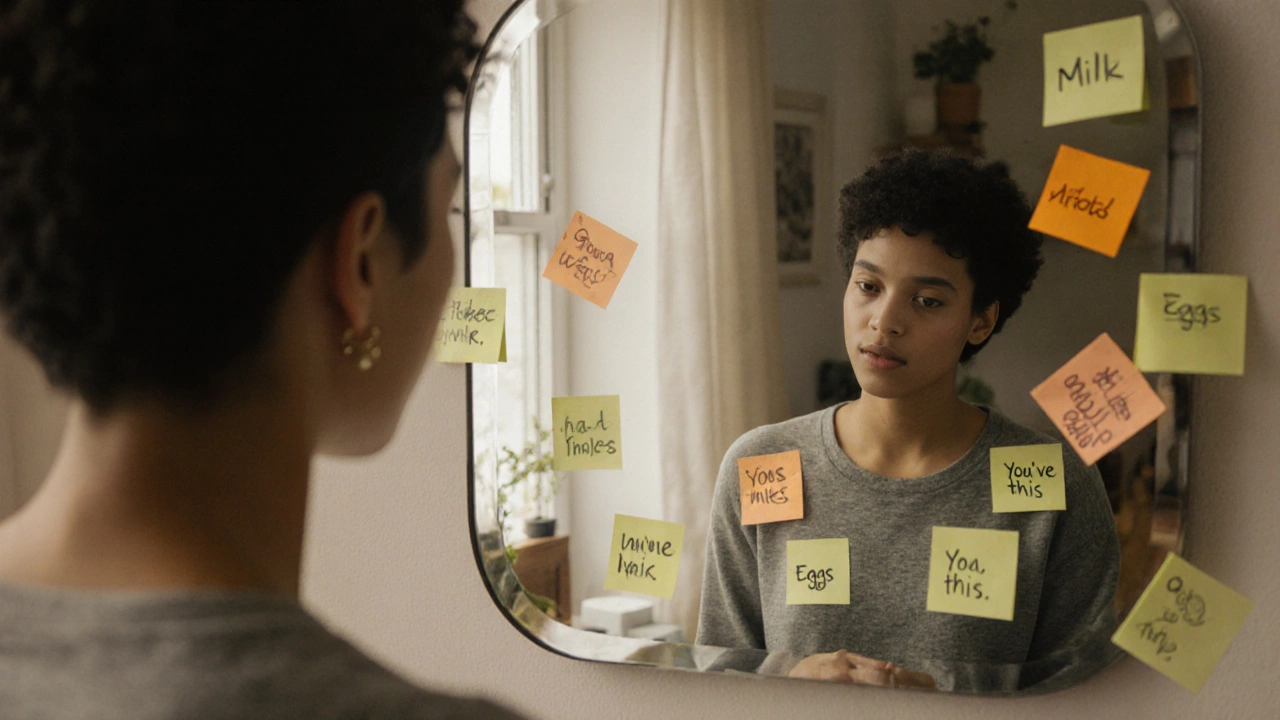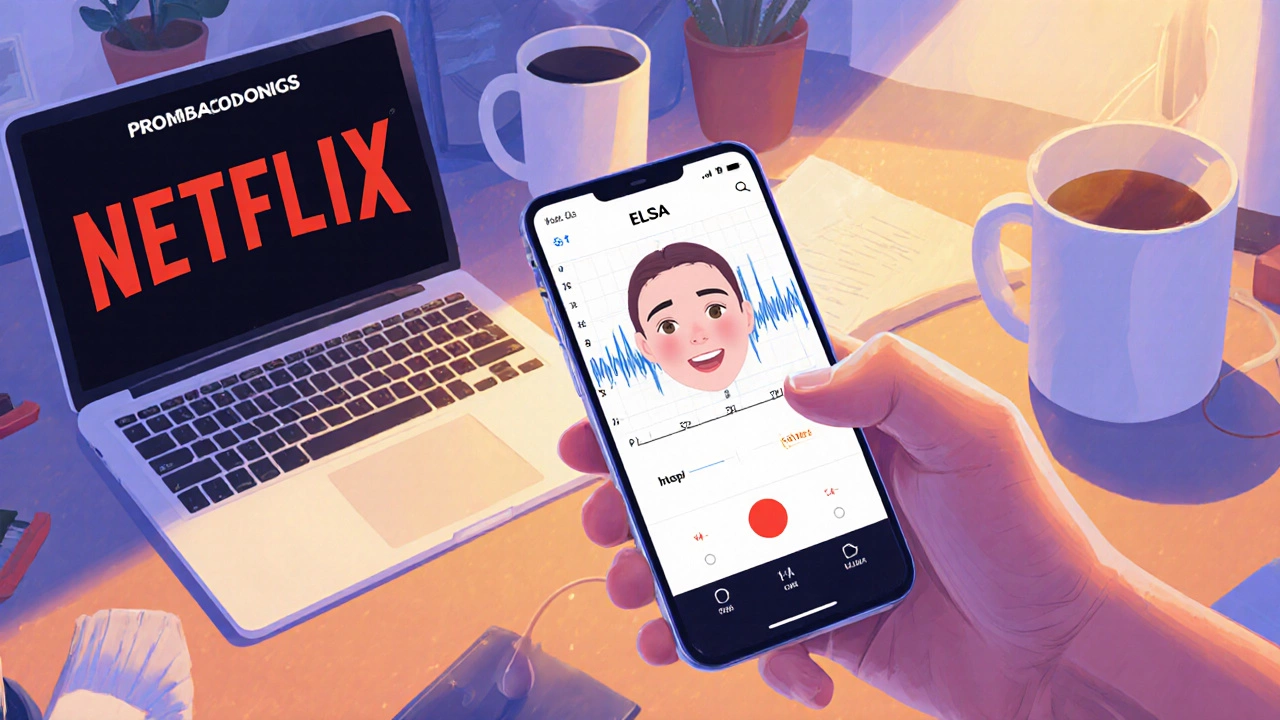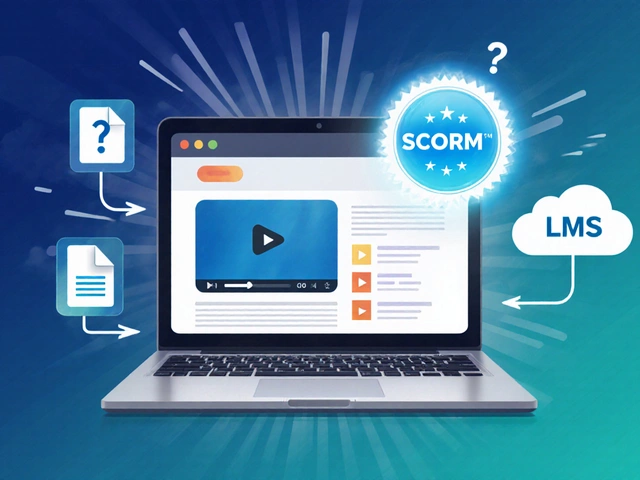
30-Day English Speaking Progress Tracker
Daily Practice Log
Track your daily English speaking activities to build fluency in 30 days.
Progress Tracker
30-Day Goals
Your Daily Practice Log
Want to speak English better but don’t have time for classes or can’t afford tutors? You don’t need to leave your house. Millions of people around the world - including in Nairobi, Delhi, and Mexico City - are learning to speak English fluently just by using their phones, laptops, and everyday routines. The key isn’t more hours. It’s smarter habits.
Stop memorizing. Start speaking.
Most people waste months memorizing vocabulary lists and grammar rules. Then they freeze when someone asks them a simple question like, "How was your weekend?" Why? Because memorization doesn’t build muscle. Speaking does.
Your brain learns language the same way it learns to ride a bike. You don’t memorize the balance. You practice until it becomes automatic. The same goes for English. You need to move your mouth, hear your voice, and make mistakes - out loud.
Start today: Say one sentence out loud every morning. Not in your head. Not whispered. Say it like you mean it. "I’m going to make coffee now." "The weather is better than yesterday." Don’t worry about perfect grammar. Just get your tongue used to forming English sounds.
Use your phone like a language coach.
You have a supercomputer in your pocket. Use it.
Download English speaking apps like ELSA Speak or Speechling. They use AI to listen to you and tell you exactly where your pronunciation is off - like whether you’re saying "think" like "sink" or "three" like "tree." These apps give you instant feedback, no tutor needed.
Here’s how to use them: Record yourself reading a short news headline. Play it back. Then record it again. Do this five times a day. After a week, you’ll notice your own voice sounding clearer. That’s your brain rewiring itself.
Don’t just listen to podcasts. Talk back. Pause every 10 seconds and repeat what the speaker said. Mimic their rhythm, their pauses, their tone. This isn’t karaoke. It’s training.
Turn your home into an English zone.
Your environment shapes your habits. If your kitchen, bedroom, and living room are full of English, your brain will start thinking in it.
Change your phone and TV settings to English. Watch Netflix shows with English subtitles - not your native language. Start with comedies or reality shows. They use real, everyday language. Shows like "Friends," "The Crown," or "Squid Game" (yes, even non-English shows have English subtitles) are goldmines.
Label things around your house. Stick notes on your fridge: "Milk," "Eggs," "Leftovers." On your door: "Handle with care." On your mirror: "Good morning, you’ve got this." Every time you see them, say them out loud. This builds automatic word recall.

Practice with yourself - yes, really.
People think they need a partner to practice speaking. Not true. You can talk to yourself better than most people.
Try this: Pick a topic. "My last vacation." "Why I like tea." "What I’d do if I won $10,000." Now talk about it for two minutes straight. Record it. Listen. Did you say "um" too much? Did you stop because you couldn’t find the word? That’s your homework.
Next day, pick the same topic. Talk again. You’ll notice you’re faster. Smoother. That’s progress.
Or pretend you’re giving a TED Talk. Stand up. Use your hands. Speak like you’re in front of an audience. Your confidence grows when you act like you already have it.
Shadowing: The secret weapon of fluent speakers.
Shadowing is what professional interpreters and actors use. It’s simple: play a short audio clip - 15 to 30 seconds - and repeat what you hear, right after the speaker. Like an echo.
Use YouTube channels like "Learn English with Emma" or "English Addict with Mr Steve." Pick one they say slowly. Play it once. Pause. Say it. Play it again. Say it again. Do this for 10 minutes a day.
After two weeks, try shadowing without pausing. Just follow along as they speak. It’s hard at first. Your tongue will feel clumsy. But after a month, you’ll notice you’re speaking faster, with better rhythm - without even trying.
Speak before you’re ready.
You don’t need to wait until you know "enough." You’ll never feel ready. That’s a myth.
Join free online English speaking groups on Facebook or Discord. Search for "English conversation practice free." You’ll find groups where people meet every night to chat. No pressure. No grades. Just real talk.
When you join, say this: "Hi, I’m learning to speak English. I’m not perfect, but I want to practice." You’ll be surprised how many people respond with kindness. Most of them were where you are, once.
Even if you only speak for five minutes, you’ve won. You’ve broken the fear barrier.

Track progress - not perfection.
Don’t measure yourself by how many words you know. Measure yourself by how often you speak without stopping.
Keep a simple journal: Every day, write down one thing you said in English. "I asked the neighbor how to fix my faucet." "I ordered food in English." "I told my cousin I was proud of her."
After 30 days, look back. You’ll see a pattern: You’re using more verbs. You’re not translating from your first language anymore. You’re thinking in English. That’s the moment everything clicks.
What not to do.
Don’t translate everything in your head. That slows you down. Learn phrases as whole units. Instead of thinking "I want to go to the market," learn "I’m heading to the market."
Don’t avoid mistakes. Every error is data. If you say "I have 25 years," and someone corrects you to "I’m 25," write it down. Next time, you’ll get it right.
Don’t wait for perfect grammar. Native speakers make mistakes too. They say "ain’t," drop "the," and use slang. Fluency isn’t about being correct. It’s about being understood.
Real results in 30 days.
Here’s what someone who follows this daily can expect:
- Day 7: You can introduce yourself without pausing.
- Day 14: You understand most of what’s said in a slow English video.
- Day 21: You can hold a 3-minute conversation without stopping to think.
- Day 30: You feel less afraid to speak - even with strangers.
This isn’t magic. It’s repetition with purpose.
You don’t need to move to London. You don’t need to spend thousands. You just need to open your mouth - every day.
Can I really improve my English speaking in 30 days?
Yes - if you practice daily and focus on speaking, not just listening. Fluency isn’t about knowing every word. It’s about being able to express yourself without freezing. With consistent daily practice - even just 15 to 20 minutes - you’ll notice real progress in 30 days. People who shadow, talk to themselves, and record their voice see faster results than those who just study grammar.
Do I need to pay for apps or courses?
No. Free tools like YouTube, free versions of ELSA Speak, and community groups on Discord or Facebook can get you to a confident level. Paid apps offer extra features like personalized feedback, but they’re not necessary. The real cost is time and consistency, not money.
What if I’m too shy to speak out loud?
Start small. Whisper. Talk to your pet. Talk to your reflection. Record yourself and listen later. The goal isn’t to be heard by others - it’s to train your mouth and brain. Once you’re comfortable hearing your own voice, speaking to others feels easier. Shyness fades with action, not with waiting.
How do I know if I’m making progress?
You’ll know when you stop translating in your head. When you understand a joke in an English movie without reading subtitles. When you dream in English. When you catch yourself thinking "I need milk" instead of "I need… milk… in English?" These are signs your brain is switching over. Keep a journal - write down one English thing you did each day. Look back in a month. You’ll see how far you’ve come.
Is it better to practice with a native speaker?
It helps - but it’s not required. Many learners wait years to find a native speaker. By then, they’re too nervous to speak. Start with yourself. Build confidence first. Once you can speak for two minutes without stopping, then find a partner. You’ll get more out of the conversation because you won’t be stuck on basic words. Practice with anyone - a friend, a classmate, an online stranger. What matters is that you speak.







